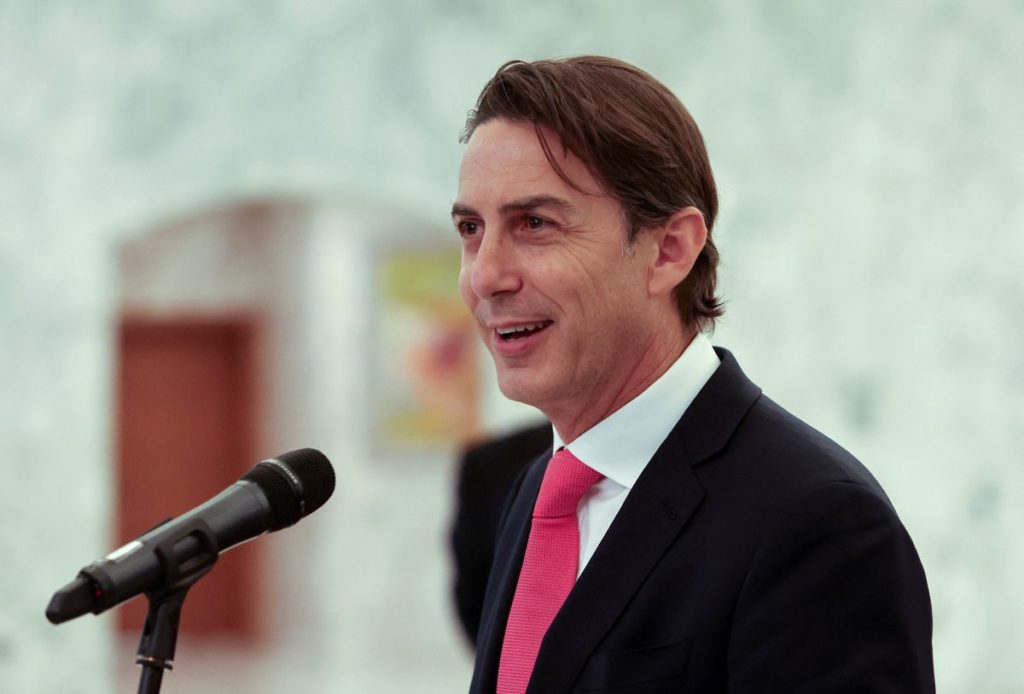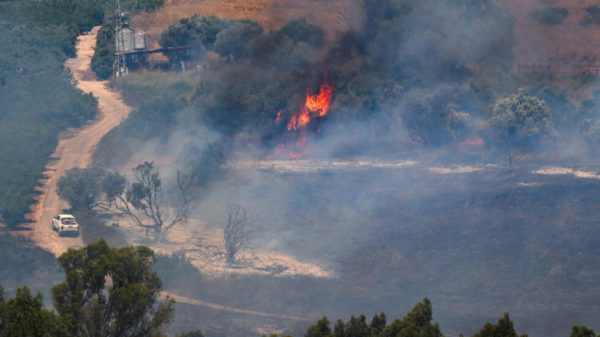A fire blazes on the Israeli side of the Israel-Lebanon border on June 18, 2024 amid cross-border hostilities between Hezbollah and Israeli forces. © Ayal Margolin, Reuters
Israeli Foreign Minister Israel Katz warned on Tuesday that a decision on an all-out war with Hezbollah was coming soon, even as the United States tries to avert any escalation.
U.S. envoy Amos Hochstein was sent to Lebanon to try and cool tensions following an increase in cross-border fire along Lebanon’s southern frontier that has escalated to Hezbollah hinting it could attack Haifa, Israel‘s third-largest city.
Iran-backed Hezbollah has been trading fire with Israel for the last eight months in parallel with the Gaza war. Last week, the group fired the largest volleys of rockets and drones of the hostilities so far at Israeli military sites, after an Israeli strike killed the most senior commander yet.
Katz said in an X post that in the wake of threats by Sayyed Hassan Nasrallah, the group’s head, to damage Haifa’s ports that are operated by Chinese and Indian companies, “we are getting very close to the moment of deciding on changing the rules of the game against Hezbollah and Lebanon”.
“In an all-out war, Hezbollah will be destroyed and Lebanon will be severely beaten,” he added.
Israel’s military later said “Operational plans for an offensive in Lebanon were approved and validated, and decisions were taken on the continuation of increasing the readiness of troops in the field”.
Israel, Katz said, would pay a heavy price but the country was united and it must restore security to the residents of the north.
Hezbollah says it will not halt its attacks unless there is a ceasefire in the Gaza Strip.
A Pentagon spokesperson said the United States did not want to see a wider regional war in the Middle East.

Hochstein, the special envoy to U.S. President Joe Biden, said he had been dispatched to Lebanon immediately following a brief trip to Israel because the situation was “serious”.
“We have seen an escalation over the last few weeks. And what President Biden wants to do is avoid a further escalation to a greater war,” Hochstein said on Tuesday.
He had met the head of Lebanon’s army earlier on Tuesday and spoke to reporters following a meeting with parliament speaker Nabih Berri, who heads the armed Amal movement, which is allied to Hezbollah and has also fired rockets on Israel.
The U.S. and France are engaged in diplomatic efforts to secure a negotiated end to the hostilities along Lebanon’s border.
Haifa footage

Meanwhile, Hezbollah published a 9-minute 31-second video of what it said was footage gathered from its surveillance aircraft of locations in Israel, including the city of Haifa’s sea and airports. Haifa is 27 km (17 miles) from the Lebanese border.
Haifa mayor Yona Yahav said Hezbollah’s video was “psychological terror on residents of Haifa and the north”.
“Whether diplomatically or militarily one way or another, we will ensure the safe and secure return of Israelis to their homes in northern Israel. That is not up for negotiation. Oct. 7 cannot happen again anywhere in Israel or on any of Israel’s borders,” Israeli government spokesman David Mencer said.
He added that Israel was “impeding Hezbollah’s military buildup and their stockpiling of weapons for terror against Israelis”.
Hezbollah began trading fire with Israel on Oct. 8, a day after its Palestinian ally Hamas attacked southern Israel, sparking the Gaza war. Tens of thousands of people have fled both sides of the border.
Hochstein urged Hamas to accept a U.S.-backed proposal for a ceasefire in Gaza, which he said “also provides an opportunity to end the conflict across the Blue Line”, a reference to a demarcation line between Lebanon and Israel where parts of the international border are disputed.
Hochstein met caretaker Lebanese Prime Minister Najib Mikati, who told him that “Lebanon does not seek escalation”, according to comments issued by Mikati’s office.
The increase in attacks last week was followed by a brief respite during the Eid al-Adha Muslim holiday, which concludes on Tuesday. Hezbollah announced a drone attack against an Israeli tank on Tuesday afternoon – its first announced attack since Saturday. An Israeli spokesperson said Israel on Tuesday targeted a Hezbollah air unit.
The group used more of its extensive arsenal against Israel last week, prompting United Nations officials in Lebanon to warn over the weekend that the “danger of miscalculation leading to a sudden and wider conflict is very real”.
(Reuters)/FRANCE24


Leave a Reply
You must be logged in to post a comment.